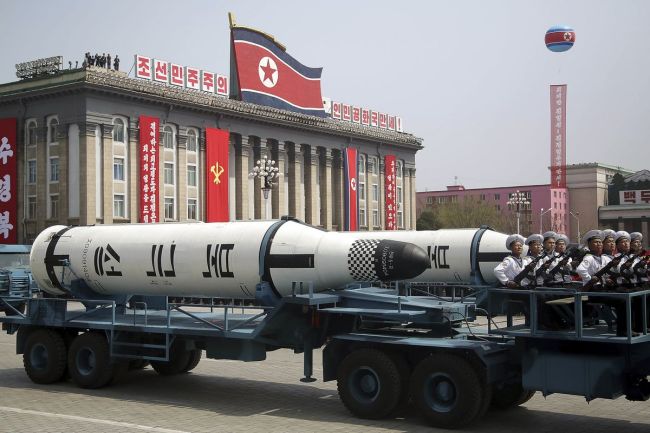‘US could see NK military parade as provocation’: expert
By Jung Min-kyungPublished : Jan. 29, 2018 - 15:56
As North Korea’s participation in the PyeongChang Olympics next month takes shape, skepticism over the rogue nation’s overture persists with an upcoming North Korean military parade -- and Seoul’s response, or lack thereof, toward the event.

North Korea is expected to follow through with its plan to hold a military parade one day before the opening of the 2018 Winter Games on Feb. 9, which some experts believe could put a damper on an Olympic detente.
The parade on Feb. 8 aims to celebrate the 70th anniversary of the founding of the Korean People’s Army.
Until 1977, North Korea celebrated Feb. 8, 1948 as the founding anniversary of the KPA, but in the following year, the country changed the date to April 25, which marks the date of the creation of anti-Japanese guerilla forces by the late founder Kim Il-sung in 1932.
Pyongyang recently announced the switch back of the KPA anniversary to Feb. 8, which sparked controversy over the event’s nature and timing.
“If North Korea decides to showcase its ‘Hwasong-14’ or new ‘Hwasong-15’ intercontinental ballistic missiles at the military parade, there is a high possibility the United States will see it as a provocation,” Shin Beom-chul, a professor at the Korea National Diplomatic Academy, told The Korea Herald, referring to the missiles that were used in a series of the North’s military provocations last year.
“It is important for the South Korean government to deliver a message to Pyongyang to refrain from making such a provocation,” he added.
North Korea has often used such events as a platform to showcase new military hardware and its latest weapons systems. Last year, it paraded ballistic missiles, including six KN-11 submarine-launched ballistic missiles, followed by the KN-15, which is a land-based version of the North’s solid-fuel SLBM.
The Joint Chiefs of Staff on Monday said the military parade is likely to resemble last year’s event and the allies are monitoring the possibility of a provocation.
But Seoul continues to maintain a rosy outlook that the upcoming games would pave the way for a US-North Korea dialogue and ultimately denuclearization.
The South’s Unification Ministry noted the international community’s concerns over the North’s military event, saying the government will draw up countermeasures.
Regarding concerns over the North taking advantage of South Korea, Baik Tae-hyun, spokesman at Seoul’s Unification Ministry, told a press briefing, “We will draw up our own countermeasures and use (the current situation) to improve inter-Korean ties and resolve the nuclear issue,” Baik Tae-hyun, spokesman at Seoul’s Unification Ministry, told a press briefing.
Baik did not elaborate on the countermeasures but he referred to Unification Minister Cho Myoung-gyon’s previous remark that the military parade is “irrelevant” to the Olympics.
Shin said the Moon administration is treading carefully, as a proposal to cancel the parade -- which the North views as a key event displaying its achievements to the world -- could lead to the North’s absence at the Winter Games.
Another expert pointed out the link between the delayed South Korea-US joint military drills and North Korea’s parade.
“The South Korean government can’t tell the North to halt the parade, but it can cite the event as grounds for holding a joint military drill with the US, after the PyeongChang Olympics.” said Koh Yoo-hwan, a professor of North Korean studies at Dongguk University.
South Korea and the US agreed to push back regular joint military drills that were scheduled to take place during the Olympics. Pyongyang has often lambasted the drills as a dress rehearsal for an invasion, although the allies have reiterated its defensive nature.
Both Shin and Koh underlined the need for tight South Korea-US communications under the current circumstances. The US has been ramping up its pressure campaign of sanctions against North Korea, while welcoming inter-Korean talks at the same time.
The opposition has also expressed concern over the liberal Moon administration’s “soft stance” toward the parade.
The main opposition Liberty Party Korea criticized the Moon administration’s lack of action to contain the North’s move, which could be perceived as a provocation.
Choung Tae-ok, the party’s floor spokesperson, said in a statement that if North Korea parades its ballistic missiles, as it has done in previous events, it could make its nuclear development program a fait accompli.
News of the North Korean military parade came amid the two Koreas’ ongoing cooperation in bringing the North to the games after North Korean leader Kim Jong-un expressed willingness to send a delegation to the Olympics.
By Jung Min-kyung (mkjung@heraldcorp.com)







![[Hello India] Hyundai Motor vows to boost 'clean mobility' in India](http://res.heraldm.com/phpwas/restmb_idxmake.php?idx=644&simg=/content/image/2024/04/25/20240425050672_0.jpg&u=)










